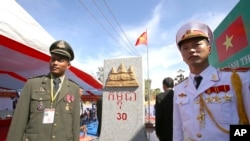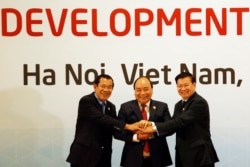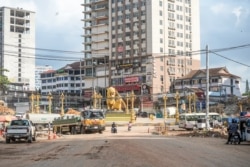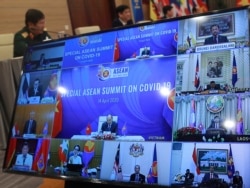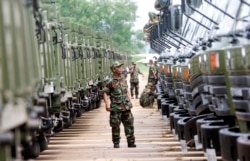The United States Embassy in Phnom Penh has been aggressively celebrating the 70th anniversary of diplomatic relations with Cambodia. Ambassador W. Patrick Murphy has not allowed the novel coronavirus pandemic to stop the year-long celebrations, which is reflected in his and the embassy’s social media posts.
At the same time, the U.S. Embassy in Hanoi also marked 25 years since the re-establishment of diplomatic ties with Vietnam, after relations ended following the prolonged war between the two nations. The U.S. Secretary of State Mike Pompeo released a video on the occasion were reaffirmed the U.S.’s commitment to a “strong and independent Vietnam.”
The two celebrations, while similar in appearance, come amid shifting geopolitical calculations where Vietnam has grown closer to the United States and the European Union. Despite a problematic rights record, Vietnam has a free trade agreement with E.U., and the U.S. has increased economic ties and defense cooperation while keeping one eye on the South China Sea conflict.
In Phnom Penh, Cambodian Prime Minister Hun Sen has distanced himself from the West, which helped establish a fledgling democracy in 1992, instead choosing to gravitate closer to China and its billions in investment and aid.
Hun Sen will travel to Beijing in August to sign a recently-concluded bilateral Free Trade Agreement, as a likely counter to the partial loss of some trade preferences to the E.U., through the ‘Everything But Arms’ scheme.
Experts and analysts told VOA Khmer that the new power dynamics have caused a strain in Cambodia’s relationship with Vietnam, which helped overthrew the Khmer Rouge in 1979 and install the current ruling elites.
Pa Chanroeun, executive director at the Cambodian Institute of Democracy, said the intensifying diplomatic and economic battle between the U.S. and China meant that the former would continue to focus on its recent association with Vietnam.
In Cambodia, the U.S. would continue to push its human rights agenda, Pa Chanroeun said, which was likely in line with Washington D.C.’s long term objective in the country given Cambodia’s reluctance to distance itself from China.
“In Vietnam, the U.S. sees a ground to realize its principal objectives of projecting its power and utilizing Vietnam’s existing strategic status quo in bid to counter China,” he said.
Cambodia’s ruling party has had deep diplomatic, economic, and military relations with Vietnam since 1979. But, in the last few years, Cambodia has moved closer to China, which has invested billions in infrastructures - China is helping build two new airports for Phnom Penh and Siem Reap, as well as an expressway to the coastal city of Sihanoukville.
The port city has seen an explosion of Chinese investment, leading to heated construction activity, the mushrooming of casinos, and an influx of Chinese nationals and workers. This has, however, resulted in resentment among local Cambodians, who say they have lost employment and have been priced out of their own city.
China’s investments are reflected in Cambodia’s increasing public debt to the country, which stands at $3.6 billion of $7.5 billion as of 2019, according to the Ministry of Economy and Finance. Along with the increased investment, China has held a “no-interference” policy when it comes to Cambodia’s domestic issues and rights record, including the recent dissolution of an opposition party, harassment of civil society groups, and shuttering of the free press.
In return, Cambodia has supported China on international forums and issues. Cambodia did not allow the release of a joint communique at the 2012 ASEAN summit, disagreeing with its regional allies over the language used to describe the South China Sea conflict.
Most recently, Cambodia enthusiastically supported China’s passing of a national security law that critics say would erode Hong Kong’s autonomous status. Prime Minister Hun Sen was the only foreign leader to visit China in February, during the peak of the country’s novel coronavirus outbreak, to express solidarity with this Chinese counterpart.
Sophal Ear, an associate professor of diplomacy at the Los Angeles-based Occidental College, said the sway towards China, and away from Vietnam, had left the ruling elite in a bind.
“The CPP is probably conflicted,” Sophal Ear said. “Their old master, Vietnam, is now [friendly] with their chief critic, the U.S. Their main patron, China, is not on great terms with Vietnam.”
Despite the geopolitical juggling, Sophal Ear said Cambodia had likely calculated that sustained investment and support from China was critical for the regime’s survival, even if it meant some deterioration in ties with their eastern neighbor.
“Vietnam doesn't have the deep pockets and largess to do this for the regime, though the regime remains eternally grateful to Hanoi for bringing it to power,” Sophal Ear said.
The Cambodian government has maintained that its relations with Vietnam remain intact, despite niggling border disputes, which recently saw the Vietnamese set up military tents along a section of the border.
Cambodia has continued to pitch Vietnam for increased investment – the eastern neighbor is already a top-five investor – especially in the agro-processing sector. Hun Sen has pitched agriculture exports and processing as a potential solution to the current economic slump in the country.
In return, Vietnam’s state-run media have reported its leader calling the bond with Cambodia as “unbreakable,” with a recent white paper on defense warning against any attempts to divide the two countries.
The geopolitical equation, as it currently stood, benefitted the region, said government spokesperson Phay Siphan.
“Equilibrium is made at this point,” Phay Siphan said. “Across the border, the U.S. is taking care of [Vietnam] while on our side there is China that taking care of [Cambodia].
The government spokesperson added that it was “god’s gift” that both the U.S. and China were looking to strengthen ties in the region.
Experts said that while Vietnam views its neighbor’s economic dependence on China with some skepticism, the setting up of a Chinese military base in southern Cambodia or a more pro-China stance from Cambodia on the South China Sea issue could lead to further friction between the neighbors.
In a first, Cambodia pushed for the United Nations Conventions on Law of the Sea to be used to resolve the maritime dispute, echoing Vietnam’s stance on the issue. Cambodia’s unprecedented mentioning of the UNCLOS was made during a recent ASEAN Summit in late June 2020, and is more in line with Vietnam’s position on the dispute.
Tran Thi Bich, a doctoral candidate at the University of Antwerp in Belgium, said Vietnam’s recent bonhomie with the U.S. was a product of the maritime dispute, but that two scenarios were likely if Chinese backed off from its claims in the disputed waters.
“First, Vietnam will not have to further deepen defense cooperation with the United States to the extent that is uncomfortable for Vietnam but necessary to defend its sovereignty,” she said.
“Second, Cambodia will not be caught between China's and Vietnam's claims, that in turn, retains good relations between Cambodia and Vietnam.”
Pa Chanroeun, from the Cambodian Institute of Democracy, said Cambodia needed to be cautious when dealing with both the U.S. and China.
“A superpower is just like fire: We will feel cold if we stay too far from them and we will feel boiling hot or even get burned if we stay too close.”




